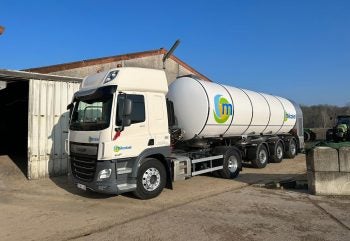
Milcobel has “parted ways” with CEO Nils van Dam, citing a “difference in vision” with the Belgium-based dairy cooperative’s board.
While the co-op said the separation with van Dam, who became CEO in 2020, was by “mutual” consent, Milcobel also referred to the “challenging” business environment, characterised in part by a peak in milk production.

Discover B2B Marketing That Performs
Combine business intelligence and editorial excellence to reach engaged professionals across 36 leading media platforms.
“Volatile markets” and “stricter sustainability requirements” in Belgium were also noted in a statement from the Kallo-based business, which sources milk from some 2,000 family-owned local dairy farmers.
Despite what Milcobel said were “strong efforts to reposition itself in a competitive dairy landscape” and to push the value-added agenda, it is now seeking a new CEO. For the time being, a “limited management team” will run the business, it added.
President Betty Eeckhaut said: “Under the leadership of Nils van Dam, Milcobel made a necessary catch-up. However, the evaluation of the realised trajectory and the preparation of the next steps revealed a clear difference in vision between [the] board of directors and CEO.
“In mutual consultation, it was therefore decided to end the cooperation.”

US Tariffs are shifting - will you react or anticipate?
Don’t let policy changes catch you off guard. Stay proactive with real-time data and expert analysis.
By GlobalDataVan Dam was credited with introducing the so-called Phoenix strategy to boost Milcobel’s value-added ambitions. However, while Eeckhaut thanked the departed CEO for making the co-op “competitive again”, he suggested the board was less than satisfied.
“We may speak of a real transformation, even if today it does not always deliver the results we aspire to. Paying an above-average milk price to our member-cooperants remains the objective. The foundations for this have been laid, now results must be achieved,” Eeckhaut added.
Milcobel registered a turnover of €1.36bn ($1.47bn) in 2022, up from €1.14bn in the previous 12 months, according to its annual report for that year.
Profits, however, diminished. The before-tax figure halved to €5.04m, while net earnings dropped to €4.3m from €10.6m.
The co-op supplies supermarket chains and local retailers and also provides ingredients to manufacturers, as well as serving private-label customers.
Its product range features cheese, including the Brugge and Nazareth Kaas brands, along with butter, milk powders, cream and whey. Milcobel also serves up ice cream to private-label accounts in Europe through its Ysco division.
In 2020, Milcobel closed a milk-production plant in Schoten, Belgium, leaving the business with seven sites.
Milcobel suggested 2023 was a taxing year marked by “the influence of sharply falling dairy markets, resulting in a lower milk price for member-cooperants”.
It is now looking at new opportunities such as a partnership with Arla Foods’ ingredients division to supply whey proteins for use in infant-formula and pharmaceutical applications, which kicked off this year. And Milcobel plans to invest in “highly valorising products”.
Eeckhaut added: “In order to be successful, we need to increase our commercial clout, among other things. We expect a new CEO to take the lead in this and inspire the teams.”



